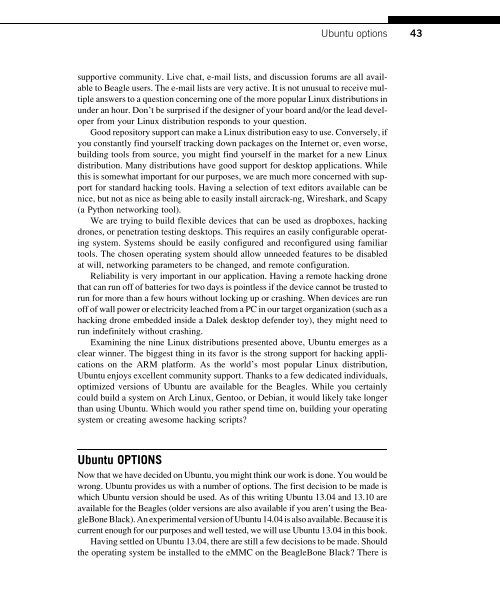Hacking_and_Penetration_Testing_with_Low_Power_Devices
You also want an ePaper? Increase the reach of your titles
YUMPU automatically turns print PDFs into web optimized ePapers that Google loves.
Ubuntu options<br />
43<br />
supportive community. Live chat, e-mail lists, <strong>and</strong> discussion forums are all available<br />
to Beagle users. The e-mail lists are very active. It is not unusual to receive multiple<br />
answers to a question concerning one of the more popular Linux distributions in<br />
under an hour. Don’t be surprised if the designer of your board <strong>and</strong>/or the lead developer<br />
from your Linux distribution responds to your question.<br />
Good repository support can make a Linux distribution easy to use. Conversely, if<br />
you constantly find yourself tracking down packages on the Internet or, even worse,<br />
building tools from source, you might find yourself in the market for a new Linux<br />
distribution. Many distributions have good support for desktop applications. While<br />
this is somewhat important for our purposes, we are much more concerned <strong>with</strong> support<br />
for st<strong>and</strong>ard hacking tools. Having a selection of text editors available can be<br />
nice, but not as nice as being able to easily install aircrack-ng, Wireshark, <strong>and</strong> Scapy<br />
(a Python networking tool).<br />
We are trying to build flexible devices that can be used as dropboxes, hacking<br />
drones, or penetration testing desktops. This requires an easily configurable operating<br />
system. Systems should be easily configured <strong>and</strong> reconfigured using familiar<br />
tools. The chosen operating system should allow unneeded features to be disabled<br />
at will, networking parameters to be changed, <strong>and</strong> remote configuration.<br />
Reliability is very important in our application. Having a remote hacking drone<br />
that can run off of batteries for two days is pointless if the device cannot be trusted to<br />
run for more than a few hours <strong>with</strong>out locking up or crashing. When devices are run<br />
off of wall power or electricity leached from a PC in our target organization (such as a<br />
hacking drone embedded inside a Dalek desktop defender toy), they might need to<br />
run indefinitely <strong>with</strong>out crashing.<br />
Examining the nine Linux distributions presented above, Ubuntu emerges as a<br />
clear winner. The biggest thing in its favor is the strong support for hacking applications<br />
on the ARM platform. As the world’s most popular Linux distribution,<br />
Ubuntu enjoys excellent community support. Thanks to a few dedicated individuals,<br />
optimized versions of Ubuntu are available for the Beagles. While you certainly<br />
could build a system on Arch Linux, Gentoo, or Debian, it would likely take longer<br />
than using Ubuntu. Which would you rather spend time on, building your operating<br />
system or creating awesome hacking scripts?<br />
Ubuntu OPTIONS<br />
Now that we have decided on Ubuntu, you might think our work is done. You would be<br />
wrong. Ubuntu provides us <strong>with</strong> a number of options. The first decision to be made is<br />
which Ubuntu version should be used. As of this writing Ubuntu 13.04 <strong>and</strong> 13.10 are<br />
available for the Beagles (older versions are also available if you aren’t using the BeagleBone<br />
Black). An experimental versionofUbuntu 14.04 is also available.Because itis<br />
current enough for our purposes <strong>and</strong> well tested, we will use Ubuntu 13.04 in this book.<br />
Having settled on Ubuntu 13.04, there are still a few decisions to be made. Should<br />
the operating system be installed to the eMMC on the BeagleBone Black? There is


